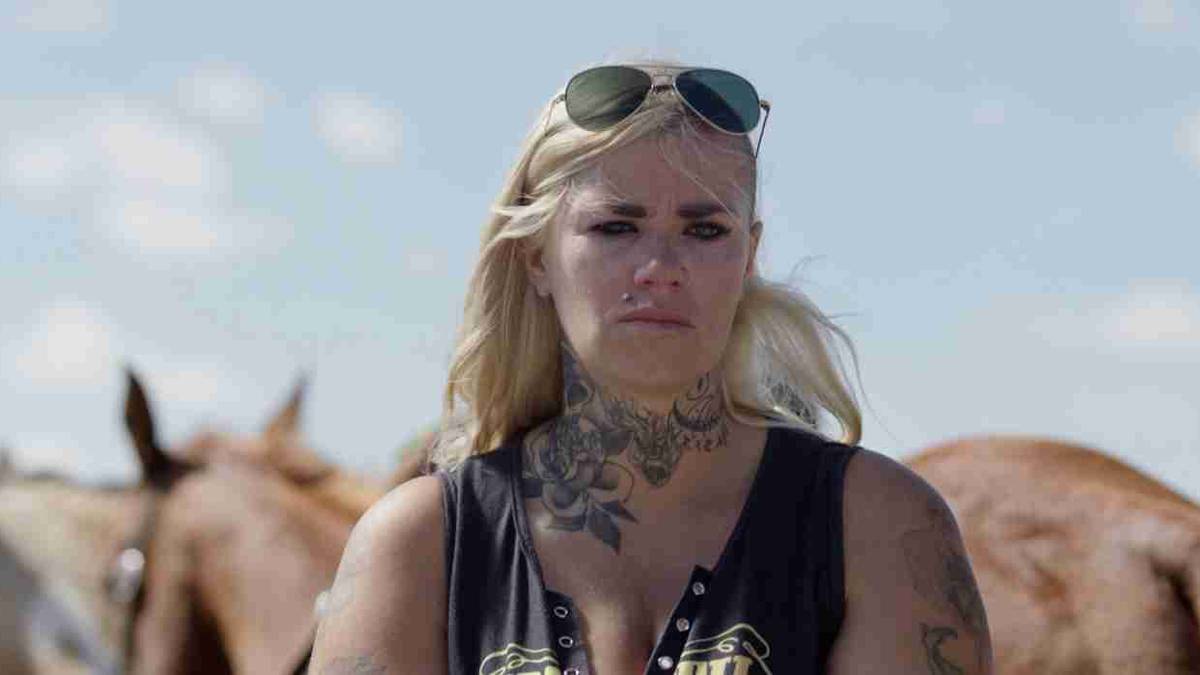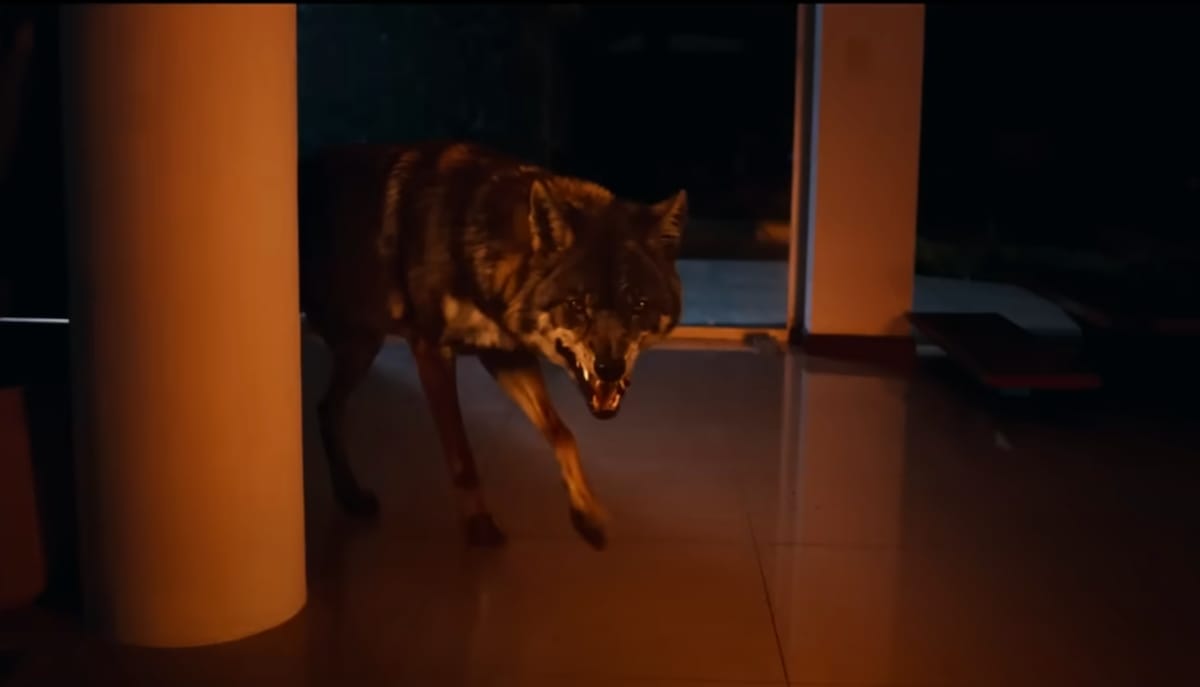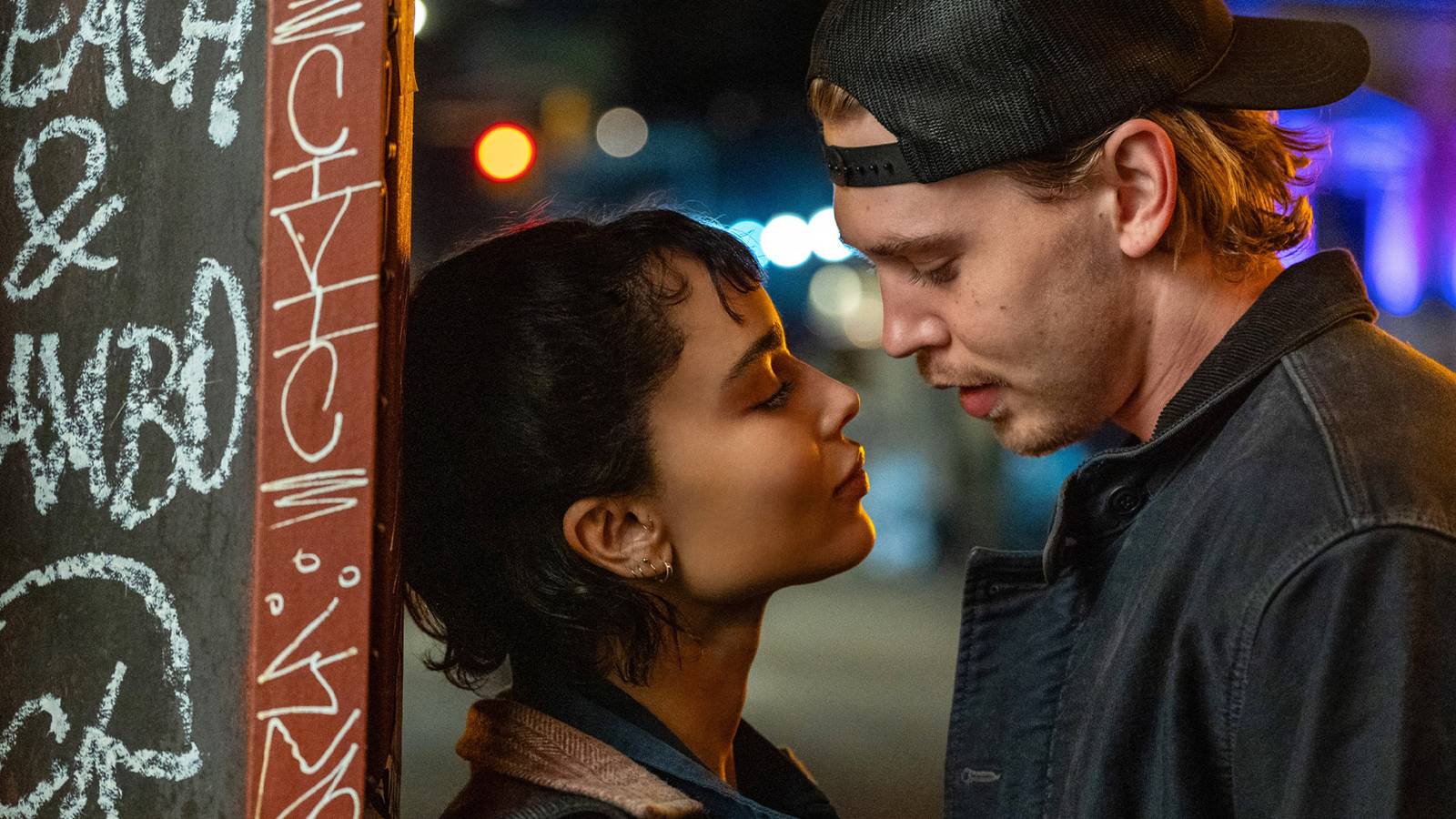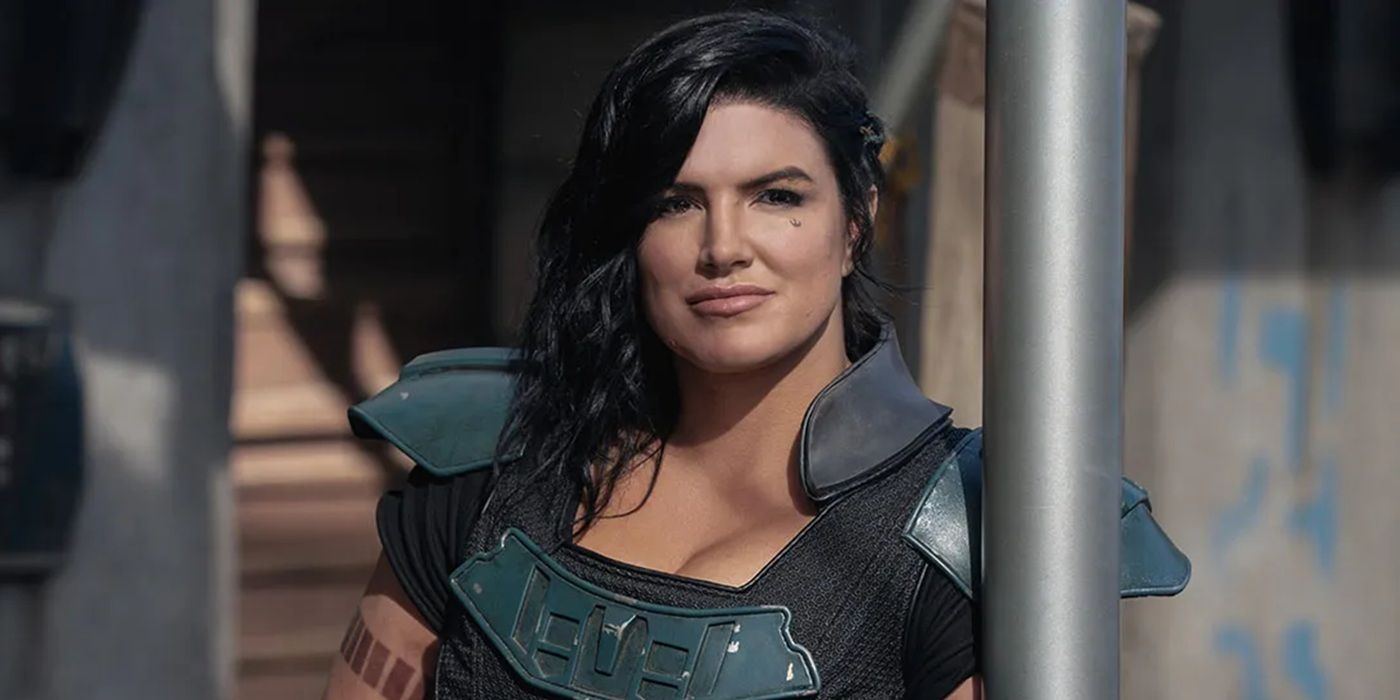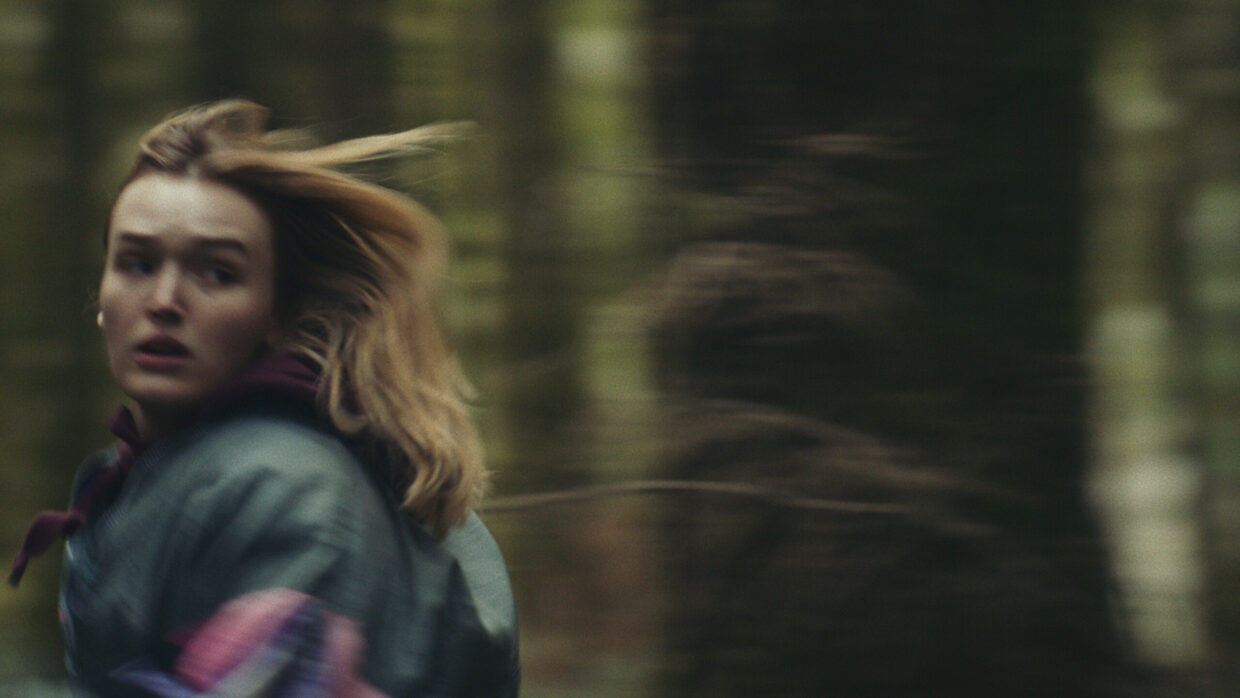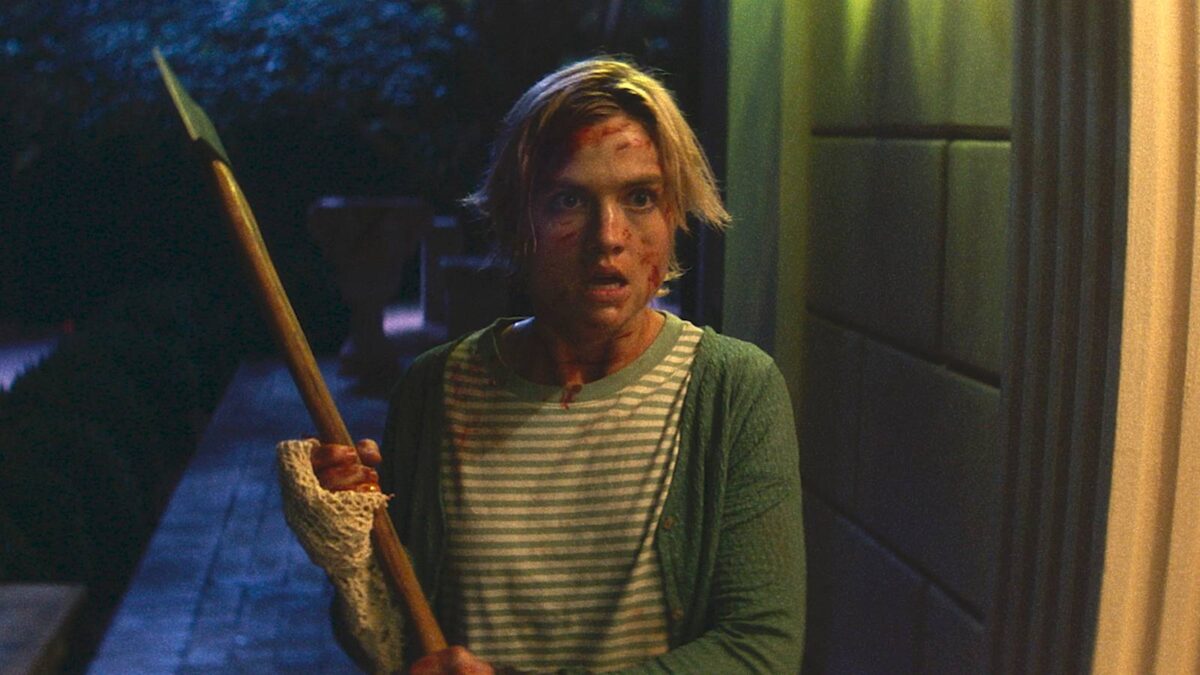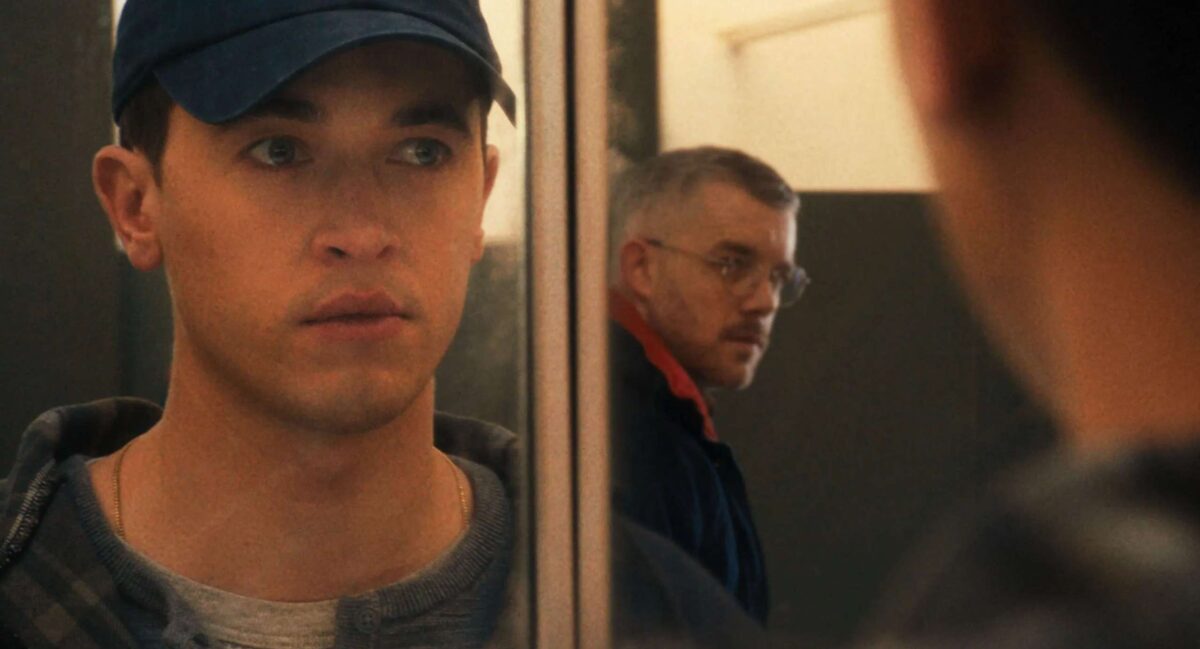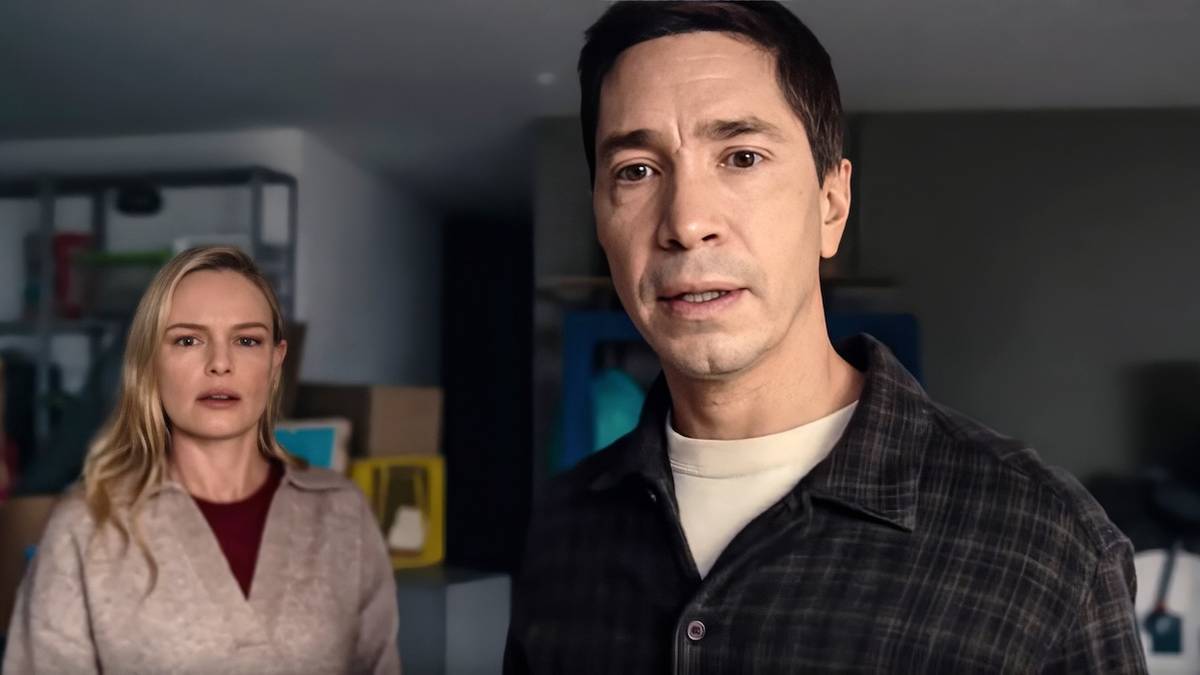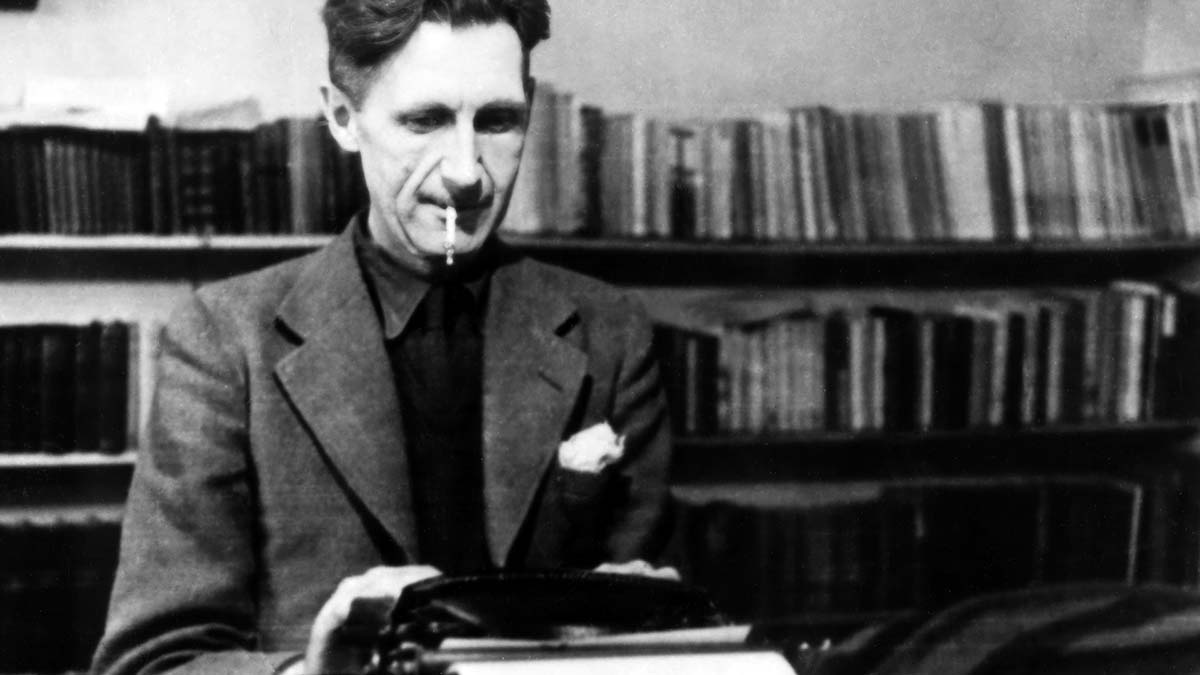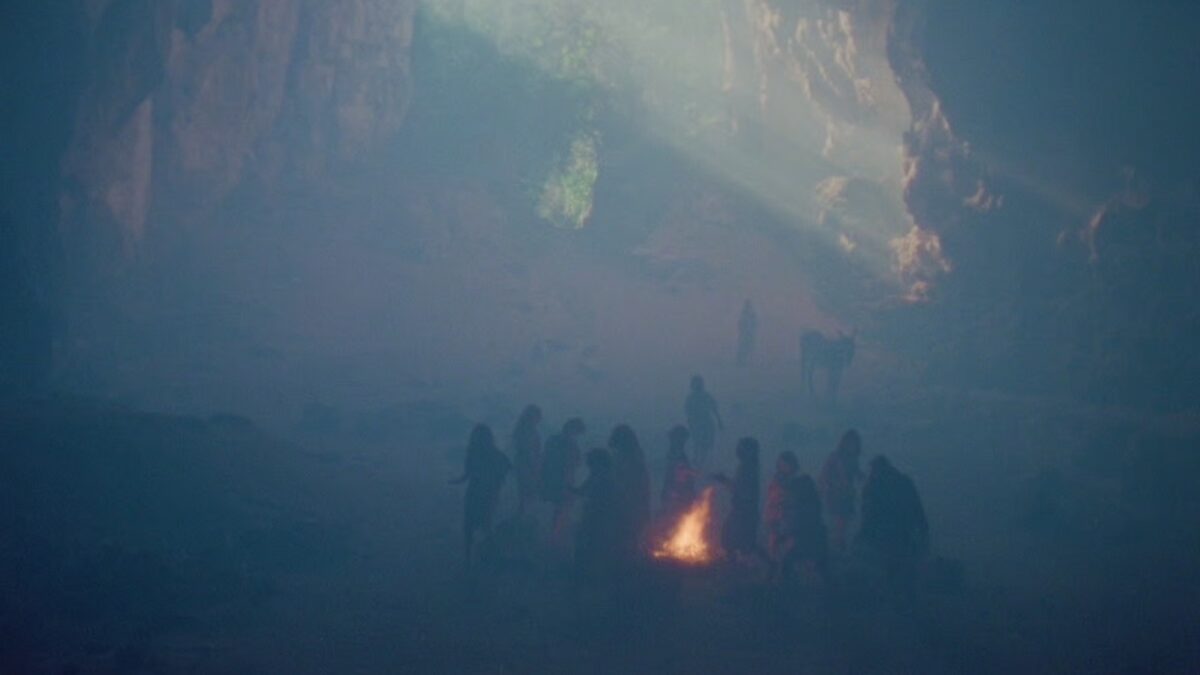
Interview: Ben Rivers on Mareâs Nest
Aug 14, 2025
Mare’s Nest
For a film about the end of the world, Mare’s Nest is hardly lugubrious. Then again, you could say the same about Ben Rivers’s entire oeuvre. Few directors who’ve kicked off their careers after the proverbial “end of history” have so assiduously used their cameras to imagine what that might look like; fewer still have pictured the Armageddon as existing somewhere between dystopia and utopia. It can be difficult to tell whether Rivers’s films are post- or pre-apocalyptic, if the solitary figures they often center on—like the old hermit riffing on Darwin’s theories from his dilapidated forest hovel in The Origin of the Species (2008), or Jake Williams, the Scottish musician-turned-woodland recluse from This Is My Land (2007), Two Years at Sea (2011), and Bogancloch (2024)—have voluntarily forsaken the comforts of twenty-first-century life or have instead survived some catastrophe. But even as it reflects on our inevitable demise, Rivers’s cinema is fueled by a contagious wonder for these sequestered spaces and their lonely residents. His primary subject isn’t the end of humanity, strictly speaking, but the endless cycles of decay and renewal all things succumb to.
In Mare’s Nest, a cataclysm has wiped all adults off the face of the Earth, leaving children to roam a grownups-free world and imagine a new one in its stead. Rivers’s script yields no clues as to what might have happened—as with his previous works, the film isn’t concerned with providing answers so much as letting us bask in all its enigmas. Acting as our chaperone is Moon (Moon Guo Barker), a nine-year-old Mare’s Nest follows on a journey that sees her cross paths with fellow Lost Children. Split into eight chapters, one for each of the girl’s encounters, the film devotes its longest to an adaptation of a 2007 one-act play by Don DeLillo, The Word for Snow. Similarly pivoting on a planetary crisis, the play stages a three-way chat between a scholar who’s given up his work and fled to a mountain, a pilgrim hungry for answers and an interpreter mediating between their different languages. Rivers’s choice to cast children for the three roles is an inspired one; as the kids deliver their lines with stern seriousness, Mare’s Nest captures the humorous mysticism of DeLillo’s dialogues in a way other adaptations failed to. And while the circuitous quality of their exchanges might come across as alienating, that’s in keeping with the original text as much as the film’s own stance towards language.
Gradually, Mare’s Nest moves away from its verbose first half to slip into a surreal fantasy. Shot on Super 16 mm by Rivers and co-cinematographer Carmen Pellon and interspersed with black and white, hand-processed sequences candied with water marks, the film feels twitchingly alive to the mysteries that pave Moon’s path. If the scripted earlier segments stand as a departure from Rivers’s traditionally observational, documentary-adjacent works, what follows feels much looser and unexpected—a voyage that brims with Moon’s own awe for those uncharted landscapes.
The day after Mare’s Nest premiered in Locarno, I sat with Rivers to discuss his fascination for Don DeLillo, the film’s approach to language and its attempt to move beyond the pessimism of many other end-of-world tales.
Filmmaker: When and where did you first come across The Word for Snow? Was it the play that set Mare’s Nest in motion?
Rivers: A friend tipped me off about it. A gallery in New York published an edition of The Word for Snow with photographs by Richard Prince, and he knew I liked DeLillo. By then I had already started thinking about making a film with kids, but it was very blurry. I wanted it to be set in a future in which there’d be no adults; that’s all I had. A film that wasn’t at all about the relationship between children and adults, and that would treat children with the utmost respect, as the intelligent beings they are. I read The Word for Snow and wondered, “Is it possible? Can I really stage this with three nine-year-old girls? Or shouldn’t Moon meet two adults instead?” But I thought the scene would be stronger if it were children only. I’d actually been in contact with DeLillo before; we have a mutual friend who’d done some work with him years back. My friend had sent him a film of mine, The Sky Trembles and the Earth Is Afraid and the Two Eyes Are Not Brothers, which screened right here in Locarno ten years ago, coincidentally.
Filmmaker: What did he make of it?
Rivers: He wrote me a letter, which is a very special piece of paper for me. He said he found it “really powerful” and was looking forward to seeing it again. That was a huge endorsement, because I’m a massive fan; it really meant a lot. A couple of years later he came across Krabi, 2562 and wrote something really kind about that film, too. So, I felt I was able to write to him and say, “I’d love to do something with this play. I’m not really sure what, but I’d like to do something.” And he just gave me his blessing. “I’m happy for you to use it,” he said, “thought I can’t really see it as a film…”
Filmmaker: One of the biggest challenges onscreen adaptations of DeLillo’s work tend to face is how to transpose and do justice to his dialogues. There’s a very particular musicality to them, which I personally struggle to see in films like Noah Baumbach’s White Noise (2022) or Benoît Jacquot’s take on DeLillo’s novella The Body Artist, Never Ever (2016). How did you go about adapting the play?
Rivers: I was really just trying to be as faithful as possible. That was also part of the deal when I spoke to his agent: I was told I couldn’t change the play. But I had no intention of tweaking anything anyway. I mean, what was I going to do, edit Don DeLillo? [chuckles] Of course I was going to stick to the text. And there’s always a kind of humor to his language, even when he’s really serious and talking about big, important things. It was a tricky thing to balance, also because I didn’t want the fact that it was children reading it to come across as funny. That’s not the kind of humor I’m talking about; I don’t think what we’re doing is inherently funny. The children read the text for weeks and took it really seriously. We practiced a lot, but I also used an autocue a lot of the time, just because I thought that might be a really good way to tone down any overacting they might feel inclined to do. They were concentrating so hard on the language, and that was the focus of their performances. I’m very happy with the way the scene turned out in the end. It may sound funny to say this about my own film, but there are some sentences they say that just choke me up a little bit. They really nailed it. I was just trying to gently guide them through the whole sequence. We shot it over three days. I built a set as well, so that we could be comfortable, the lighting consistent and no changes would be required.
Filmmaker: For all its concerns about our planet’s demise, Mare’s Nest is never a dour, punitive watch. How did you handle the film’s tone?
Rivers: That was really important to nail. We live in apocalyptic times, and of course that’s mirrored in a lot of popular culture. Any post-apocalyptic TV show or film is understandably dystopic—full of violence, collapsed buildings. But the more I thought about it while I was writing, the more I wanted to avoid any of that. I wanted to steer clear of conflict. In the very early stages of the script there was some of it, but I really didn’t want to move into Lord of the Flies territory. I wanted the opposite. I think the fact that there are kids on their own, with no adults around, makes the journey disturbing enough. They’re trying to survive, but also, in some ways, start afresh. I was trying to strike a balance between a very disturbing situation and a more hopeful one. I think the trouble we’re in right now as a species comes from our being stuck in this deep capitalist mode, which is so difficult to think beyond. It’s hard to imagine something other than total disaster, collapse and death. It’s obvious why we should think that way, but I think we need to go beyond that. Working with kids was so great precisely because they have an innate capacity for reinvention. You put a kid in a quarry and they start to explore, to invent things out of it. That’s what I love, and I wanted some of that energy.
Filmmaker: So how much of Mare’s Nest was scripted, and how much was captured on the spot? There are moments when the camera seems content to just let the children interact with their environment.
Rivers: I mean, there was a script, but also a great deal of openness around it. This is a 98-minute film, but the screenplay itself wasn’t 98 pages. The Word for Snow is obviously a very precise text, and there were other bits that were more rigid, so to speak, like the opening sequence, when Moon picks up the tortoise and delivers this monologue about the beginning of the Earth. Those moments were scripted, but there were others that were much more fluid, as when she meets those children who live in caves by the sea. Rituals happen, they eat food—that’s just a couple of paragraphs of descriptions, not an actual shooting script. We were in that cave for a day; a donkey, 25 kids and a couple of women who looked after them. I just took the children there and we started to play and build what might happen within the space. Those bits were certainly more improvised; I was finding out what worked and got them to repeat things that l liked the look of. When I first went to the cave and saw this huge space, this aperture shrouded in blackness, it was clear that I needed to film them coming in and starting to do stuff.
Filmmaker: You remain deliberately vague as to the exact nature of the apocalypse. Spelling out what happened is something Mare’s Nest isn’t concerned with. I was curious to hear more about that restraint.
Rivers: That’s just how I operate, I guess. I don’t like to explain. I’d rather create a world which the audience can enter, as if you were coming into a new space and trying to understand what’s going on. Personally, I find that interesting. When I was getting to know Jake [Williams], I liked the fact that I did not know everything about his past. I want to translate that feeling and pass it on to the viewer, in a way. With Mare’s Nest, I didn’t feel like I had to explain much. There are many reasons why the world might collapse—and we can all just imagine why adults might have disappeared. I myself don’t know what happened, exactly, but I don’t think you need to for the film to work.
Filmmaker: Yet there’s an interesting transition from the film’s talky first half to the more impressionistic second, in which dialogues become sporadic and the film trades words for quieter, almost mystical sequences. What motivated that shift?
Rivers: That was deliberate, and it’s partly to do with DeLillo’s play—which isn’t just word-heavy but also in some fundamental ways about language. The extinction of things goes hand-in-hand with the extinction of all languages. If these kids were really trying to start afresh, to reinvent the world from scratch, then maybe they’d also have to find other ways to communicate. They might not need language anymore. Or if they do, it may be of a different kind altogether. I remember asking one of the girls by the fire, in the ritual’s scene, if she wanted to say something about the way she imagined the future, and she recited this amazing, dreamy kind of poem. I thought it was just incredible, and when I asked her what kind of future she was thinking about she said, “Tonight!” [laughs] It was a beautiful thing to see; she spoke as if in a trance. That was enough to me. We were moving into a mode of being that defied description and exposition. Suddenly we were outside all of that.
Filmmaker: Is that why you decided to name one of Mare’s Nest’s later chapters after your 2008 short, Ah, Liberty!? There’s a line in that film that seems to speak to this transition: “Liberty to me is the absence of ideas […] Feelings, impressions—that’s the real life.”
Rivers: That’s exactly right. People don’t need to know or have seen that film, but for me part of the reason for making Mare’s Nest was a desire—well, maybe desire is the wrong word, but a yearning—to get back to some of the energy of Ah, Liberty! I really enjoyed making that film, and I still love it. I mean, I like all my films—they’re my babies—but I’d been thinking about that one a lot, especially after the pandemic. I kept picturing all these kids locked indoors, and I wanted to create a world in which they’d be able to break out and be free again—free of knowledge and of language, too.
Filmmaker: I think DeLillo himself went through a similar shift. Compared to novels like Underworld, whose protagonist goes as far as to say that learning and mastering words is “the only way you can escape the things that made you,” The Word for Snow suggests the opposite: words obfuscate and will eventually replace things.
Rivers: Yeah, that’s a huge shift, in terms of his thinking as well as his writing. Some people—wrongly, in my opinion—would argue that he wrote his best work in the 20th century, and that these tighter 21st-century pieces are not as strong. But I find them very powerful. It’s as if he embraced a more poetic way of thinking, which really chimes with me.
Filmmaker: There’s a fragility to your images—so full of marks, glitches, flares—that can make your films feel like relics disintegrating as you watch. Could you speak about your cinematography?
Rivers: I really like this idea of things dying as you watch. I guess that owes to my choice to shoot on film, and that’s connected to the kinds of places and ideas that I’m interested in, which are about transformations, one way or another. I don’t know if I would call it fragility though. To me, it’s also a kind of physicality—a stuffiness, dirtiness and water. With my black-and-white films, water is especially important. Most of Bogancloch, for instance, was hand-processed, so you get these leftover water mark residues, which I think is what you might be referring to when you speak of this slow disintegration of things. But I don’t see that in negative terms. If anything, it’s a positive theme: things going through cycles, renewing themselves.
Filmmaker: Maybe that’s why your films often feel so alive. I do not mean this in any simplistic sense; there were moments, watching Mare’s Nest, when the frames seemed to radiate Moon’s own curiosity for and openness to the unknown, the uncharted.
Rivers: That’s how I’d like them to feel, of course, but Moon herself was a big part of that. She’s such a strong character.
Filmmaker: How did you cast her, and what was it like to work with her and the other kids?
Rivers: Moon was easy. She’s the daughter of a friend—the filmmaker and novelist Xiaolu Guo—and came very early, while I was writing. I’d known Moon from when she was much younger, and when I asked her if she’d be interested in starring and she accepted, that helped me a lot with the writing, because then I could picture the character with her intelligence and humor—a child who moved across this strange world and helped us navigate it, too. Working with her was always a joy. We had a lot of fun, a lot of laughs. But she can be really serious, too. We started shooting when she was nine and finished when she was 12. It was quite a stretch. And sure, sometimes she’d get impatient, but never that much. The hardest bit was staging The Word for Snow, only because she fidgets a bit. The other two kids in the scene could stay still in between takes, but as soon as I’d say cut Moon would just bounce around.
Filmmaker: I’m always impressed with the way your cinema seems to run counter to traditional aesthetics and storytelling norms. Mare’s Nest is no exception in that regard.
Rivers: I’m glad you think that, but I certainly don’t try to be different—you don’t think about that as a filmmaker, really. At least I don’t. I just do what comes naturally to me, and I think you have to make the kind of work that feels right to you, whatever that is. I remember in the beginning I used to think a lot about audiences and camera placement and how I was supposed to make a film, then I realized I had to reinvent myself.
Filmmaker: When did that change?
Rivers: It was a sort of epiphany. I spent about four years making a 20-minute film in my twenties, and I learned a lot through that. I learned how to use a 16mm camera, and a great deal about cinematography. But I was really into Georges Franju at the time, and I think the film was trying hard to ape his work. In the end it got shown, and as I watched it again I remember thinking, “You’re not Franju. You’ll never be Franju. You live in a different time, you had a different mother, you’ve read different books. You’ve got to forget this.” So, I started again from scratch. I got my Bolex camera and rolls of film and just started going out, filming without any real idea of what the film would turn out to be. I thought I’d just use the camera and see, as though I was going out with a sketch pad and a pencil—just start filming and see what happens. And eventually, one or two of these little sketches turned into films: one, two, three minutes long… It took me a while to get an idea of what I like, of who I really am.
Publisher: Source link
Erotic Horror Is Long On Innuendo, Short On Climax As It Fails To Deliver On A Promising Premise
Picture this: you splurge on a stunning estate on AirBnB for a romantic weekend with your long-time partner, only for another couple to show up having done the same, on a different app. With the hosts not responding to messages…
Oct 8, 2025
Desire, Duty, and Deception Collide
Carmen Emmi’s Plainclothes is an evocative, bruising romantic thriller that takes place in the shadowy underbelly of 1990s New York, where personal identity collides with institutional control. More than just a story about police work, the film is a taut…
Oct 8, 2025
Real-Life Couple Justin Long and Kate Bosworth Have Tons of Fun in a Creature Feature That Plays It Too Safe
In 2022, Justin Long and Kate Bosworth teamed up for the horror comedy House of Darkness. A year later, the actors got married and are now parents, so it's fun to see them working together again for another outing in…
Oct 6, 2025
Raoul Peck’s Everything Bagel Documentary Puts Too Much In the Author’s Mouth [TIFF]
Everyone has their own George Orwell and tends to think everyone else gets him wrong. As such, making a sprawling quasi-biographical documentary like “Orwell: 2+2=5” is a brave effort bound to exasperate people across the political spectrum. Even so, Raoul…
Oct 6, 2025

